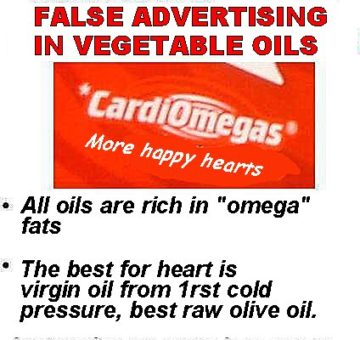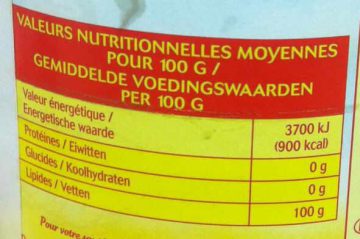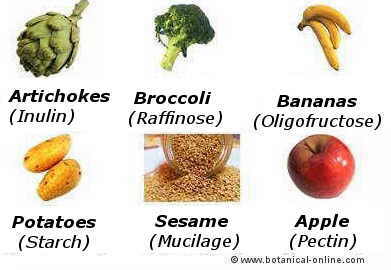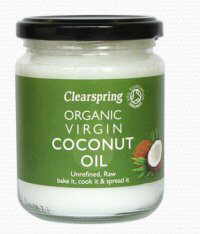Contents
Labeling of vegetable oils

Fraudulent oil labels
One of the most common deceptions on oil labels is that they are advertised as heart-healthy oils.
It is increasingly common to find labels like “rich in omega” or “healthy for the heart.” It is a misleading advertisement because ALL oils contain omega fats.
Highlighting these normal properties may lead us to believe that these oils have better properties than others, while all have them.
The healthiest thing about an oil is not its omega fats but rather they are virgin and cold-pressed first oils, with all its antioxidant vitamin E and its healthy fats not damaged by refinement.
In addition, you should also use the oil well and point out: eating fried (in any oil) is not healthy for the heart, especially if they are eaten fried regularly.
Misleading words: Vegetable, pure, natural and without cholesterol

Some data found on the labels and that can lead to error are:
- Vegetable: All oils come from plants, such as rapeseed, coconut, palm, olive, … It is not specified whether they are refined or not. That an oil is vegetable is no novelty or guarantee of quality.
- Pure: The word pure refers to that it contains 100% a type of vegetable oil, that is, no different vegetable oils have been mixed. It does not specify whether they are refined or virgin oils of cold pressure, so that being pure is no guarantee of quality.
- Natural: Most countries have an advertising “legal vacuum” in everything that is natural. It is a word that is used in advertising to give positive connotations in a product, but it really means nothing.
- Without cholesterol: Vegetable oils never have cholesterol, it is not a novelty, because this substance is always found in animal foods. On the other hand, if we eat a lot of fried in oil, cholesterol will increase, because our body produces it from excess fat.
Do not specify the type of fats they contain

All oils contain 100% fat. What the composition label should indicate is the type of fat they contain: saturated, monounsaturated or polyunsaturated.
* Related information: How to take evening primrose oil supplements
An oil with antioxidants?
The best option is always a virgin oil, although they are usually more expensive. However, some refined oils compensate for the loss of antioxidants from the refined by adding a lot of vitamin E (or by using transgenic seeds rich in vitamin E). It may be an acceptable option for people who cannot afford virgin oils economically.
Attention! All oils contain antioxidants or vitamin E . The distinctive thing is that it contains a lot of vitamin E, and so it should be indicated on the package.
These oils are usually sunflower. Although they contain vitamin E, being a very polyunsaturated type of oil, it should not be used for frying. It is better to use it raw. If you what to fry, use high oleic sunflower oil, instead. (See: which is the best healthy oil?)
![]() More information on vegetable oils
More information on vegetable oils








